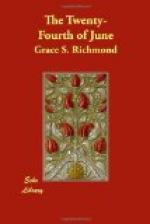“Oh, is it like that to you?” queried Roberta softly, out of the darkness. “To me it’s as if I were walking down the nave of a great cathedral—Westminster, perhaps—big and bare and wonderful, with the organ playing ever so far away. The sun is shining outside and so it’s not gloomy, only very peaceful, and one can’t imagine the world at the doors.” She looked over at her mother, whose face was just visible in the shaded light. “What is it to you, lovely lady?”
“It is a prayer,” said her mother slowly, “a prayer for peace and purity in a restless world, yet a prayer for service, too. The one who prays lies very low, with his face concealed, and his spirit is full of worship.”
The light was put out; the three, father, mother, and daughter, came together in the fading fire-glow. Roberta laid a warm young hand upon the shoulder of each. “You dears,” she said, “what fortunate and happy children your four are, to be the children of you!”
Her father placed his firm fingers under her chin, lifting her face. “Your mother and I,” said he, “consider ourselves fairly fortunate and happy to be the parents of you. You are an interesting quartette. ’Age cannot wither nor custom stale’ your ‘infinite variety.’ But age will wither you if you often sit up to play Bach at midnight, when you must teach school next day. Therefore, good-night, Namesake!”
Yet when she had gone, her father and mother lingered by the last embers of the fire.
“God give her wisdom!” said Roberta’s mother.
“He will—with you to ask Him,” replied Roberta’s father, with his arms about his wife. “I think He never refuses you anything! I don’t see how He could!”
CHAPTER XI
“THE TAMING OF THE SHREW”
“School again, Rob! Don’t you hate it?”
“No, of course I don’t hate it. I’m much, much happier when I’m teaching Ethel Revell to forget her important young self and remember the part she is supposed to play, than I am when I am merely dusting my room or driving downtown on errands.”
As she spoke Roberta pushed into place the last hairpin in the close and trim arrangement of her dark hair, briefly surveyed the result with a hand-glass, and rose from her dressing-table. Ruth, at a considerably earlier stage of her dressing, regarded her sister’s head with interest.
“I can always tell the difference between a school day and another day, just by looking at your hair,” she observed, sagely.
“How, Miss Big Eyes, if you please?”
“You never leave a curl sticking out, on school days. They sometimes work out before night, but that’s not your fault. You look like one of Jane Austen’s heroines, now.”
Roberta laughed a laugh of derision. “Miss Austen’s heroines undoubtedly had ringlets hanging in profusion on either side of their oval faces.”
“Yes, but I mean every hair of theirs was in order, and so are yours.”




